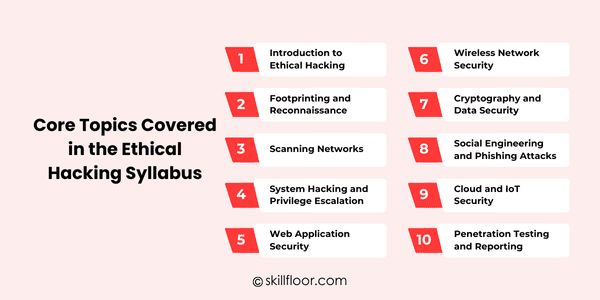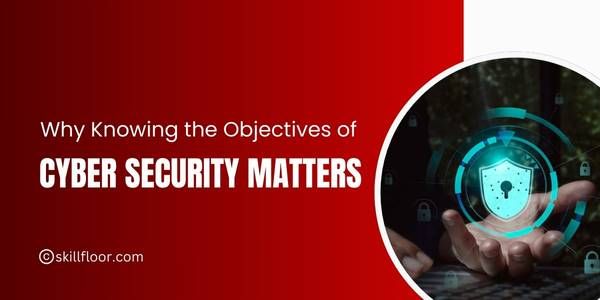Key Topics Covered in the Ethical Hacking Syllabus
Our Ethical Hacking syllabus covers network security, penetration testing, cryptography, and essential tools to safeguard systems from cyber threats.

Did you know that cyber threats are getting more serious as technology advances? Every day, there is a danger of data breaches and assaults for individuals, businesses, and governments. We have witnessed big businesses lose confidential data to cybercriminals. Fortunately, ethical hackers—also referred to as white-hat hackers—seek out vulnerabilities and safeguard systems before cybercriminals can take advantage of them.
Ethical hacking is about understanding how attacks operate and preventing them, not simply about breaking into systems. By identifying vulnerabilities before hackers do, skilled experts help companies maintain security. To guarantee that professionals have the necessary abilities to safeguard systems, a well-organized ethical hacking syllabus should include network security, penetration testing, and cybersecurity fundamentals.
Credibility is increased by Certified Ethical Hacker certificates from reputable cybersecurity associations like EC-Council. Ethical hackers are employed by IT behemoths like Microsoft and Google to safeguard networks. These experts provide security for companies, governments, and individuals in today's digital environment by operating lawfully and according to stringent requirements.
What is Ethical Hacking?
The technique of testing computer networks, programs, and systems to identify security flaws before hackers can take advantage of them is known as ethical hacking. The talents of ethical hackers, also referred to as white-hat hackers, are used to improve cybersecurity and protect people and companies from online dangers and data breaches.
Ethical hackers, in contrast to malevolent hackers, operate under tight legal restrictions and with the appropriate authority. They find vulnerabilities, properly report them, and assist companies in closing security gaps using specific tools and procedures. Ethical hacking is essential in today's digital environment for safeguarding private information and averting intrusions.
The Importance of Ethical Hacking in Cybersecurity
-
Prevents Cyber Attacks: By seeing security holes before attackers do, ethical hackers assist companies in avoiding ransomware attacks, data breaches, and illegal access to private data. Risks are greatly decreased by proactive security.
-
Protects Personal and Business Data: Ethical hacking guarantees that business and personal data is safe in the face of growing cyber threats. It helps in the prevention of financial fraud, identity theft, and company interruptions.
-
Strengthens Network Security: Ethical hackers assist companies in strengthening their security defenses by scanning networks for weaknesses. Frequent security audits protect systems against viruses and any hacking attempts.
-
Ensures Compliance with Security Regulations: Businesses have to abide by data protection regulations. Avoiding legal repercussions, upholding business standards, and preserving consumer confidence in cybersecurity measures are all made possible by ethical hackers.
-
Boosts Career Opportunities: Professionals in cybersecurity are highly sought after. Essential skills gained from ethical hacking courses provide the way for interesting careers in cyber defense, penetration testing, and IT security.
-
Builds a Safer Digital World: As technology develops, ethical hackers are essential to safeguarding users, securing online systems, and making sure that everyone has access to a safer, more dependable internet.
Why Organizations Need Ethical Hackers
Businesses are in danger of data breaches and financial losses due to the daily rise in cyber threats. Hackers are always coming up with new ways to take advantage of weaknesses. Businesses spend money on cyber security professionals who proactively find and close security flaws before hackers can take advantage of them in order to combat these threats.
Professionals can find vulnerabilities in databases, apps, and networks due to a well-organized ethical hacking syllabus. By using their expertise to evaluate security solutions, ethical hackers help firms stay ahead of cyber threats. By fortifying defenses, they assist companies in upholding consumer confidence and adhering to international security standards.
Growing Demand for Ethical Hacking Skills in the Cybersecurity Industry
-
Rising Cyber Threats: Due to the rise in cyberattacks worldwide, companies require knowledgeable ethical hackers to safeguard confidential information, stop breaches, and guarantee strong safeguards against changing threats.
-
High Demand for Cybersecurity Experts: Cybersecurity is one of the most sought-after and rapidly expanding job domains, with companies from all sectors looking to ethical hackers to safeguard their networks.
-
Attractive Career Opportunities: Global prospects, professional advancement, and well-paying positions are all provided through ethical hacking. To protect digital assets, a variety of businesses, including IT, healthcare, and finance, employ ethical hackers.
-
Government and Corporate Security Needs: Companies and governments use ethical hackers to strengthen national security, safeguard vital infrastructure, and stop malevolent intruders from conducting cyber spying.
-
Growing Use of Advanced Technologies: Cybersecurity concerns rise with the use of cloud computing, IoT, and AI by enterprises. Ethical hackers assist companies in safeguarding new technology and defending against online attacks.
-
Need for Compliance and Regulations: Ethical hackers are needed in many businesses to guarantee adherence to security regulations like GDPR and HIPAA, avert legal problems, and safeguard user privacy.
Core Topics Covered in the Ethical Hacking Syllabus
1. Introduction to Ethical Hacking
Understanding the basics is essential before getting into hacking tactics. The fundamental ideas of ethical hacking and its significance in cybersecurity are covered in this section.
Key Learning Points:
-
What is ethical hacking, and how does it differ from malicious hacking?
-
The different types of hackers: White Hat (ethical hackers), Black Hat (cybercriminals), and Grey Hat (a mix of both).
-
Understanding legal and ethical considerations in hacking.
-
Overview of cybersecurity laws and frameworks like GDPR, HIPAA, and PCI-DSS.
-
The role of ethical hackers in preventing cyber threats and securing systems.
Why It’s Important:
By finding vulnerabilities before thieves take advantage of them, ethical hacking guarantees security. It is a responsible and necessary ability in today's digital world as it helps secure sensitive data, stops cyber threats, and complies with regulatory requirements.
2. Footprinting and Reconnaissance
Learning about a target is the first stage in ethical hacking. This procedure, called reconnaissance and footprinting, aids hackers in locating possible weaknesses before an assault.
Key Learning Points:
a. Types of reconnaissance:
-
Passive Reconnaissance: Collecting data using methods like social networking, search engine optimization, and public data analysis that don't involve direct engagement.
-
Active Reconnaissance: Interacting directly with the target while utilizing network scanning tools to find open ports and services.
b. Techniques for information gathering:
-
Google Dorking: Use advanced search operators to find databases that are publicly accessible, hidden files, and sensitive information online.
-
Whois Lookup: Retrieving ownership, contact, and hosting provider information related to domain registration.
-
OSINT (Open-Source Intelligence): Tools like Maltego, Shodan, and Recon-ng.
Why It’s Important:
Before doing penetration testing, ethical hackers use footprinting to evaluate security threats. Reconnaissance techniques are included in the Ethical Hacking Syllabus to guarantee that experts can assess risks, spot flaws, and fortify cybersecurity defenses before attackers take advantage of them.
3. Scanning Networks
Ethical hackers use network scanning once reconnaissance is finished to find open ports, active devices, and system vulnerabilities.
Key Learning Points:
a. Different types of network scanning:
-
Port scanning: Identifying potential points of entry for attackers by detecting open and closed ports on a system.
-
Network scanning: Investigating communication channels and security flaws by mapping every device that is currently connected to a network.
-
Vulnerability scanning: Discovering vulnerabilities in networks, apps, or systems in order to stop any intrusions and breaches.
b. Popular tools used in scanning:
-
Nmap: A popular tool for safely detecting active services, finding hosts, and scanning networks.
-
Wireshark: Capturing and examining network data in order to find vulnerabilities, unusual activity, and security threats.
-
Zenmap: An easy-to-use graphical version of Nmap that makes network scanning and vulnerability identification simpler.
Why It’s Important:
Network scanning is necessary to find security holes before they are exploited. The scanning techniques included in the Ethical Hacking Syllabus assist professionals in protecting sensitive data from cyber threats, securing networks, and preventing breaches.
4. System Hacking and Privilege Escalation
Using security vulnerabilities to obtain unauthorized access is known as privilege escalation and system hacking. To bolster defenses, stop cyberattacks, and guarantee that systems are safe from possible threats, ethical hackers examine these vulnerabilities.
Key Learning Points:
a. Common attack techniques:
-
Brute-Force Attacks: Gaining illegal access to systems and user accounts by using automated methods to guess passwords.
-
Exploiting Vulnerabilities: Finding and taking use of flaws in systems or software to get around security measures and obtain access.
-
Session Hijacking: Stealing login information and taking over accounts by intercepting ongoing user sessions.
b. Privilege escalation:
-
Vertical privilege escalation: Exploiting system flaws and getting around security measures to obtain administrator or root access.
-
Horizontal privilege escalation: Gaining access to another user's account without raising privilege levels, frequently by using credentials that have been stolen or are weak.
c. Tools used for hacking and exploitation:
-
Metasploit Framework: An effective tool for testing for vulnerabilities, replicating real-world assaults, and penetration testing.
-
Hydra: An advanced brute-force tool for assessing authentication security and password cracking.
-
John the Ripper: A widely used tool for recovering passwords that is used to reinforce authentication systems and find weak passwords.
Why It’s Important:
Ethical hackers use system hacking techniques to test security holes before attackers take advantage of them. Privilege escalation is part of the Ethical Hacking Syllabus to guarantee that cybersecurity experts can defend systems against intrusions and security breaches.

5. Web Application Security
Web application security helps in defending websites from online dangers such as viruses, hacking, and data leaks. To provide safer online platforms and stop illegal access to private data, ethical hackers investigate vulnerabilities.
Key Learning Points:
a. OWASP Top vulnerabilities:
-
SQL Injection: Introducing malicious queries into databases in order to gain access to, alter, or remove private user and corporate information.
-
Cross-Site Scripting (XSS): Inserting malicious scripts into webpages in order to distribute malware, alter content, or steal user data.
-
Broken authentication: Unauthorized access to user accounts results from attackers circumventing authentication due to inadequate login protection.
b. Security testing tools:
-
Burp Suite: A strong tool for security testing that effectively finds and evaluates vulnerabilities in online applications.
-
OWASP ZAP: An open-source program for identifying and repairing web vulnerabilities in apps.
-
Nikto: An application for scanning web servers for security flaws, out-of-date software, and other issues.
Why It’s Important:
Every day, websites handle confidential information, thus online security is essential. Ethical hackers can defend applications, stop cyberattacks, and shield consumers from data breaches by using the security techniques taught in the Ethical Hacking Syllabus.
6. Wireless Network Security
Wireless network security shields Wi-Fi against online dangers including data theft and hacking. For companies and people utilizing wireless networks, ethical hackers find weaknesses, stop illegal access, and guarantee safe communication.
Key Learning Points:
a. Common wireless hacking techniques:
-
Cracking WEP, WPA, and WPA2 Encryption: Breaching poor Wi-Fi encryption in order to obtain illegal access, intercept information, and take advantage of network weaknesses.
-
Rogue Access Points: Creating fictitious Wi-Fi networks in an attempt to fool users into connecting and steal their business or personal information?
-
Evil Twin Attacks: Installing malware, monitoring traffic, and intercepting login credentials by setting up a fake Wi-Fi hotspot.
b. Wi-Fi security tools:
-
Aircrack-ng: An effective tool for testing wireless security that cracks encryption keys and captures packets.
-
Wireshark: Examining wireless network traffic to identify possible threats, suspicious activities, and dangers of data interception.
-
Kismet: A tool for tracking live Wi-Fi activity and identifying unwanted access points and concealed wireless networks.
Why It’s Important:
Wi-Fi security is necessary to defend networks from online attacks. Wireless security measures are included in the Ethical Hacking Syllabus to assist ethical hackers in preventing unwanted access and safeguarding private and sensitive company information.
7. Cryptography and Data Security
By encrypting data to stop unwanted access, cryptography protects sensitive information. Secure communication, user privacy protection, and effective company defense against cyber-attacks and data breaches are all made possible by an effective cybersecurity framework.
Key Learning Points:
-
AES (Advanced Encryption Standard): An encryption technique that is commonly used to protect private information by turning it into unintelligible code and preventing unwanted access.
-
RSA (Rivest-Shamir-Adleman): A strong encryption method that ensures private online communication and safeguards sensitive data through secure data transmission.
-
Hashing Algorithms: Passwords are changed into fixed-length encrypted codes using techniques like SHA and MD5, which improve security by thwarting password theft and manipulation.
How Cryptography Helps Prevent Data Breaches
Sensitive information is protected by encryption, which makes sure that hackers trying to gain illegal access cannot read or use it even if it is stolen.
Why It’s Important:
Digital assets must be secured using cryptography. Encryption techniques that ethical hackers use to safeguard private information online, stop cyberattacks, and preserve sensitive data are included in the Ethical Hacking Syllabus.
8. Social Engineering and Phishing Attacks
Social engineering and phishing attacks trick victims into divulging private information. Ethical hackers research these strategies in order to inform people, stop fraud, and increase security awareness against online dangers.
Key Learning Points:
a. Types of social engineering attacks:
-
Phishing emails: Phishing emails that look authentic are sent by cybercriminals to fool consumers into disclosing passwords, bank account information, or other private data.
-
Pretexting: To trick victims into disclosing private information or taking illegal activities, attackers fabricate situations that seem plausible.
-
USB drop attacks: Infected USB devices are left in public areas by hackers in the hopes that people would plug them in and unintentionally install malware.
b. Tools used for phishing simulations:
-
Social Engineer Toolkit (SET): An effective tool that ethical hackers use to evaluate an organization's security awareness and mimic phishing assaults.
Why It’s Important:
Cyberattacks typically take advantage of human mistakes. Social engineering techniques are included in the Ethical Hacking Syllabus, helping ethical hackers educate users, stopping phishing frauds, and enhancing general security awareness inside businesses.
9. Cloud and IoT Security
The use of Internet of Things (IoT) devices and cloud computing by enterprises increases security vulnerabilities. Data security, breach prevention, and network security are all aided by ethical hackers who guard against cyberattacks that target these technologies.
Key Learning Points:
-
Cloud Security Risks and Best Practices: Cloud infrastructures are vulnerable to issues like misconfigurations and data breaches. Ethical hackers put security measures in place to stop cyberattacks and illegal access.
-
IoT Hacking: Cameras and assistants are examples of smart technologies that may be compromised. These gadgets are tested and secured by ethical hackers to stop online attacks.
-
Security Tools: AWS Security Hub aids in cloud security monitoring, and Shodan checks IoT devices for weaknesses to improve defense against online attacks.
Why It’s Important:
Cloud security is crucial for businesses that keep important data online. IoT and cloud security are covered in the Ethical Hacking Syllabus, which aids ethical hackers in preventing data breaches and defending sensitive systems against online assaults.
10. Penetration Testing and Reporting
Security flaws are examined by ethical hackers, who then record their results. In order to assist organizations, improve cybersecurity and defend systems against possible cyber threats and assaults, penetration testing professionals disclose vulnerabilities.
Key Learning Points:
-
How to Perform Penetration Tests: To make sure systems are safe from actual threats, ethical hackers test defenses, find security holes, and mimic cyberattacks.
-
Creating Professional Security Reports: Businesses are better able to recognize and address security flaws when vulnerabilities, threats, and recommendations are documented in thorough security reports.
-
Real-World Case Studies of Penetration Testing: Understanding attack methods, security lapses, and tactics for enhancing cybersecurity measures may be gained by examining previous penetration test results.
Why It’s Important:
Reporting vulnerabilities accurately enables firms to address them effectively. Security experts offer practical insights to bolster cyberspace defenses against possible attacks through penetration testing and reporting, which are covered in the Ethical Hacking Syllabus.
As cyber dangers get more complex, there is an increasing demand for ethical hackers. To protect sensitive data and stop assaults, organizations depend on qualified experts. Essential subjects like penetration testing, network security, and cryptography are covered in a well-designed Ethical Hacking Syllabus, ensuring that professionals get practical knowledge. Ethical hackers are essential to upholding cybersecurity norms, safeguarding companies, and bolstering digital defenses. Maintaining a current understanding of the Ethical Hacking Syllabus aids professionals in adjusting to emerging security threats as technology advances. Acquiring these abilities helps create a safer and more secure online environment in addition to improving professional prospects.





























































